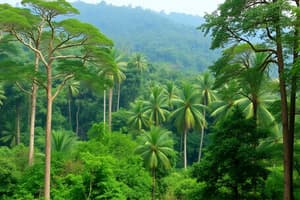Podcast
Questions and Answers
What was one of the main reasons for intensified deforestation in India during the British rule?
What was one of the main reasons for intensified deforestation in India during the British rule?
- Agricultural expansion (correct)
- Conservation efforts
- Rapid industrialization
- Promotion of biodiversity
Which forests were primarily used for commercial purposes under the Indian Forest Act of 1865?
Which forests were primarily used for commercial purposes under the Indian Forest Act of 1865?
- Community forests
- Village forests
- Reserved forests (correct)
- Protected forests
When was the Forest Society established by the British in India?
When was the Forest Society established by the British in India?
- 1878
- 1865
- 1864
- 1946 (correct)
Which forestry method favored the use of natural forests for teak and sal by the British?
Which forestry method favored the use of natural forests for teak and sal by the British?
In which year was the Forest Act enacted to further divide forest areas under British colonial rule?
In which year was the Forest Act enacted to further divide forest areas under British colonial rule?
What purpose did reserved forests primarily serve during British colonial rule?
What purpose did reserved forests primarily serve during British colonial rule?
What was the primary reason for conflicts between local communities and the colonial government?
What was the primary reason for conflicts between local communities and the colonial government?
During the colonial period, what was the main priority of the forest department?
During the colonial period, what was the main priority of the forest department?
What activity further accelerated deforestation during World Wars I and II?
What activity further accelerated deforestation during World Wars I and II?
What did local communities primarily rely on forests for?
What did local communities primarily rely on forests for?
How did the Forest Act impact local communities?
How did the Forest Act impact local communities?
What is the lasting legacy of the complex relationship between forest society and colonization?
What is the lasting legacy of the complex relationship between forest society and colonization?
Flashcards are hidden until you start studying
Study Notes
Forest Society and Colonization: An Exploration of Deforestation, Colonial Forest Policies, Management Techniques, and Community Interactions
The intricate web of forest society and colonization is a poignant chapter in human history, tracing its roots back to the British period in India. This article delves into the processes of deforestation, colonial forest policies, management techniques, and the complex relationship between society and forests.
Deforestation and Rise of Commercial Forestry
During the British rule, deforestation in India intensified due to the need for agricultural expansion and the cultivation of commercial crops such as rubber, tea, and coffee. By 1865, the Indian Forest Act was enacted, dividing forest areas into reserved, protected, and village forests, with reserved forests primarily used for commercial purposes.
Colonial Forest Policies
The British established the Forest Society in 1946 to conserve forests, which they later used for their commercial purposes. In 1864, the Indian Forest Service was set up in Dehradun, and in 1878, the Forest Act was enacted, further dividing forest areas.
Management Techniques
The British employed scientific forestry methods to manage forests, favoring the use of natural forests for teak and sal, which were suitable for building ships and railways. The Forest Act of 1878 introduced a system of classifying forests based on their suitability for various purposes.
Interactions between Society and Forests
The Forest Act imposed taxes and restrictions on villagers, leading to rebellions and conflicts between local communities and the colonial government. Local communities relied on forests for fuel, fodder, and leaves, while the forest department prioritized trees for building ships and railways.
Impact of Colonization on Forests
The colonial period led to a systematic and extensive deforestation, clearing large areas for commercial crop cultivation and plantations. World Wars I and II further accelerated deforestation, as large areas of forests were cut down to meet the needs of the British troops and supply timber for various purposes.
Conclusion
The complex relationship between forest society and colonization has left a lasting legacy, shaping land use patterns, conservation efforts, and the development of forest management techniques. Understanding this history is crucial for addressing current challenges and informing policy decisions to protect forests and their ecosystems.
Studying That Suits You
Use AI to generate personalized quizzes and flashcards to suit your learning preferences.




